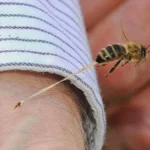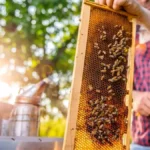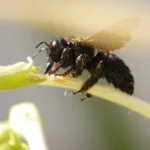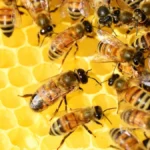People often mistake a bee sting with a bee bite. This article investigates which bees can bite humans. In so doing, we answer the question – can bees bite humans? We show that yes, they can, and they can also bite, or in some cases do both.
In conversations, many people will tell you they were bitten by a bee meaning they were stung by a bee. Generally, we get bitten by spiders and snakes and stung by bees, wasps, and scorpions. However, bees are crafty little critters and even the ones that sting can also bite. We will investigate this and clear up a whole lot of misconceptions about how bees bite humans. Naturally, we will start with our favourite little ladies – the honeybees.
Do Honey Bees Sting Or Bite?
Honeybees can do both. When they sting they inject a cocktail of poisons into your body. To summarize bee venom is a nasty, crafty cocktail of chemicals that the bee uses with the direct intention of either killing you or teaching you a lesson for life.
Honey Bee Stings
Bee venom contains among other things adrenaline, dopamine, histamine, hyaluronidase, noradrenaline, phospholipases, serotonin, apamin, melittin, and mast cell-degranulating peptide.
Histamine triggers inflammation and allergic response/swelling. Mast cell degranulating peptide also makes your body release more histamine of its own. The phospholipase enzymes actually dissolve nerve cells and cells in general. Melittin is a particularly nasty one in that it actually causes pain by making your nerves feel like they are burning.
This is just a brief summary. If you want to understand bee venom, this is an excellent overview.

Learn more about: What Eats Bees In The Food Chain
Honey Bee Bites
After a bee has bitten you, it leaves its sting embedded in your skin. The bees stomach will pull out and an alarm pheromone marks the site where you were stung. This will encourage other bees to sting you if you don’t move away.
The bee will die shortly afterwards, but, she will still try her best to scare you. She will buzz up against your face, and she will find soft parts of your body and furiously bite them with her mandibles. Bee mandibles are quite strong and can actually deliver a good bite. I have had a bee actually bite the soft skin on my eyelid so that it bled.
When you have been stung, the feeling of a bee biting you and making small spots of pain can sometimes trick you into thinking you are being stung again. In this way, the one bee loses her life – and amplifies how much she scares you.
Now we also know what bees bite. The bit soft parts of you, where you will feel it.
So now we have answered this question – honeybees can bite humans! And they can sting humans.
But Do All Bees Sting?
No. A lot of bees, both honeybees, many solitary bees, bumble and carpenter bees will sting. However, there are a large number of bee species that cannot sting. These have a rather apt name.
Stingless Bees
The stingless bees or meliponines are a group comprising about 550 species. These bees are confined to the tropics and subtropics and are very diverse and complex in the way they maintain their societies and do bee stuff in genera.
Meliponina are funny little critters. My first exposure to them was in the Congo. The Congo is not a place for the faint-hearted. The forests and jungle of the Congo are full of scary, dangerous things. My friend pointed out a little turret emerging from the base of a tree/ground in the jungle. He said, stingless bee. Let’s take honey.
We lit the smoker and went to the bees. They poured out in their thousands and clustered all over my face, climbed up my nose, into my ears, biting, scratching and buzzing. They crawl onto your eyeballs and try to climb under your eyelids. This particular species seems to be able to carry propolis collected from Euphorbia trees. When this gets in touch with your mucous membranes it burns for hours and can actually cause blindness.
I can assure you that I would much rather be stung by an angry swarm of honeybees, or even maybe wasps. These little bees crawl around your clothes and in your hair. They are an absolute nuisance. The after-effects of the poisonous plant resins that they smear on you are also far worse than a bee sting.
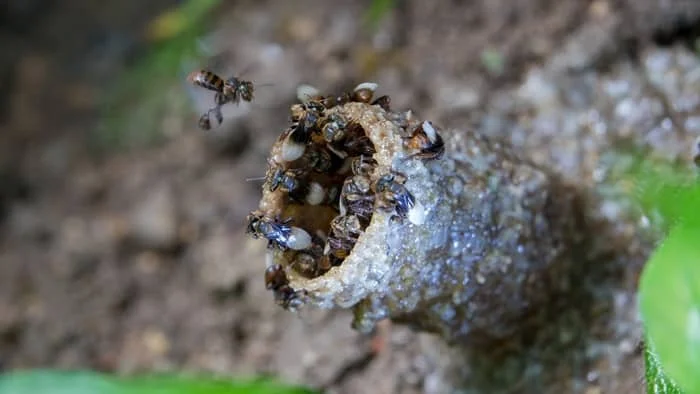
Sweat Bees
These are also stingless bees. Trigona gribodoi or mopane flies are a species of stingless bees found in Southern Africa. They will accumulate around your eyes and on your face trying to drink your sweat as you walk through the warm bushveldt.
These animals are really really irritating.
Stingless Bee Honey
We have covered how honeybees dry honey and ventilate their hives here. Honeybees produce a concentrated nectar sugar solution which is preserved by its high concentration of sugars. Bacteria and yeast simply cannot grow in this honey because it has too much sugar in it.
Stingless bees are not able to concentrate their honey as much and store nectar in honey pots in the hive. There are lots of different types of stingless bees, and each one has its own special tricks to preserve nectar. For many of these bees, the trick is to mix some sort of natural preservative into the honey.
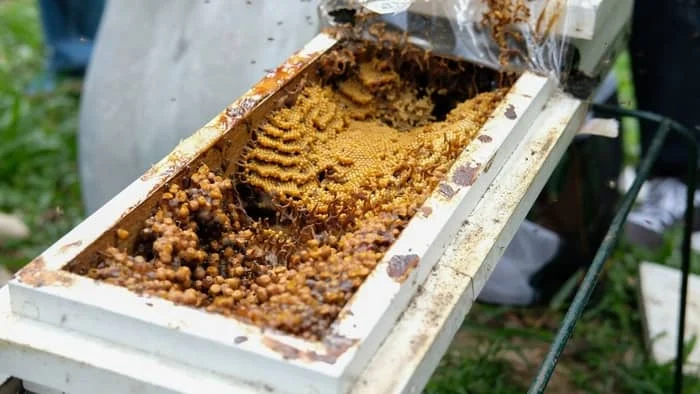
In the case of us as humans, these natural preservatives are generally excellent medicines. Stingless bee honey contains compounds that fight yeast and bacterial infections. For humans, this means we can use stingless bee honey to treat yeast infections, such as oral thrush. Rumour has it in African societies that this honey is also used to treat other types of thrush which can be a problem in the lower reaches of the body.
The Stingless Bee Myth
We now know that some bees sting, and all bees bite. Surprisingly bees that bite can also carry chemicals in their mouths and on their legs, which, when in contact with eyes and mucous membranes will actually cause a stinging sensation. In conclusion, it is just safe to say that honey is very nice. Any insect which produces the stuff is going to have to have a whole arsenal of weapons to defend its liquid gold honey.
If you found this interesting, please share. And remember, if you are walking through the jungle in the Congo, and some guy suggests you raid a stingless beehive because they cannot sting – he is trying to play a joke on you.
Learn more about: Bees and Your Neighbours and The Law
Bee Bites FAQs
1. Can bees bite humans?
Yes, bees can bite humans. In addition to stinging, bees like honeybees have strong mandibles (jaws) and can deliver a bite to soft areas of skin. Though less common, bee bites can cause discomfort and are often mistaken for additional stings when experienced in conjunction with a sting.
2. Do honeybees bite or sting more often?
Honeybees are more likely to sting than bite. Their sting is their primary defense mechanism, releasing venom to protect the hive. Biting occurs occasionally when bees need to fend off predators or bite soft human skin, but it is secondary to stinging.
3. What happens when a bee bites you?
When a bee bites, it uses its mandibles to pinch your skin, but unlike a sting, no venom is injected. However, bees may carry plant resins or propolis in their mouths, which can cause irritation if they come in contact with human skin.
4. Can all bee species sting or bite?
No, not all bees can sting or bite. Some species, like stingless bees, cannot sting at all but may still bite to defend themselves or their colonies. For example, sweat bees and stingless bees often bite to deter threats.
5. Do bee bites hurt as much as stings?
Bee bites are typically less painful than stings. A sting injects venom, causing more pain and potential allergic reactions. A bee bite, while uncomfortable, does not introduce venom but may still irritate sensitive skin.
6. Are stingless bees harmless if they can’t sting?
While stingless bees can’t sting, they can bite and may cause irritation with plant materials carried in their mouths. In some cases, their bites can be more of a nuisance, particularly when they swarm or target soft, sensitive areas like the eyes or ears.
7. How can I avoid getting bitten or stung by bees?
To avoid bee bites and stings, it’s best to remain calm around bees, avoid swatting at them, and wear protective clothing if working near hives. Avoid strong fragrances and brightly colored clothing, which can attract bees.

Dr. Garth A. Cambray is a Canadian/South African entrepreneur and beekeeper with 28 years of experience in apiculture and specializes in adding value to honey. His Ph.D. research developed a new advanced continuous fermentation method for making mead that has resulted in a number of companies globally being able to access markets for mead. His company, Makana Meadery, exports honey mead to the USA where it is available to discerning connoisseurs. He has also developed technologies to commercially manufacture organic honey vinegar in Zambia for export globally. He holds a few patents globally in the ethanol industry and believes in technology and knowledge transfer for human development and environmental sustainability. One of his proudest achievements is the fact that the wind farm he started at one of his old apiary sites has essentially made his hometown carbon neutral.

